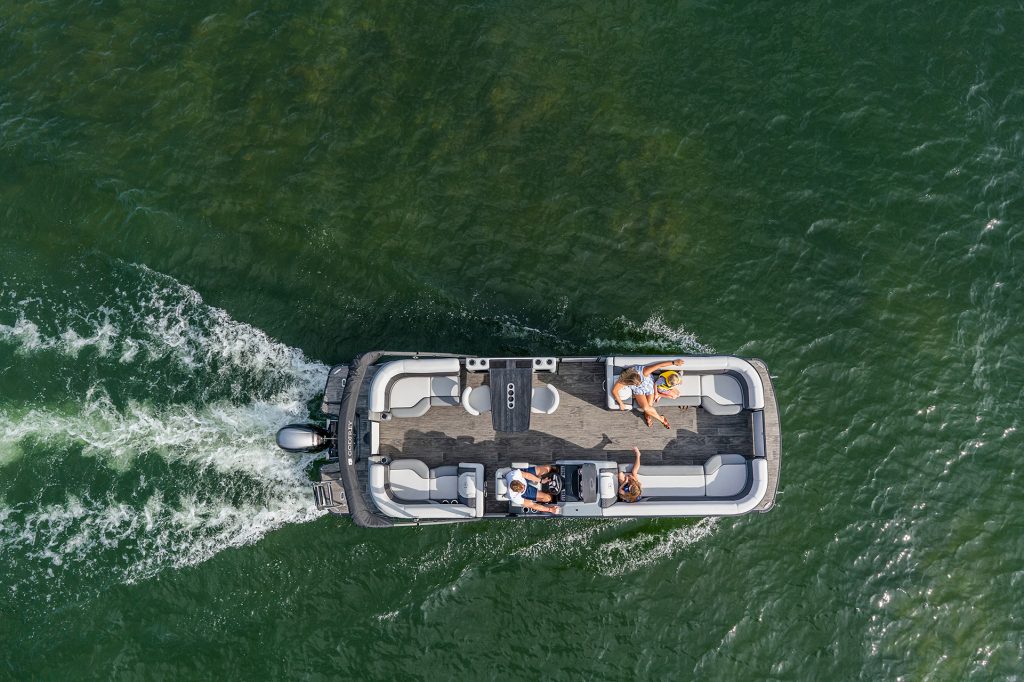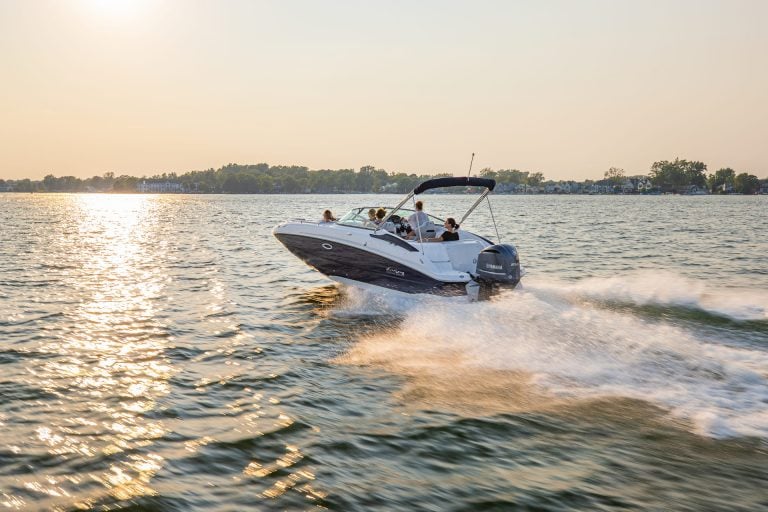When choosing a boat, it’s important to understand how much it might weigh, as you’ll need to know how many pounds your boat is before purchasing or renting a trailer or lift. A pontoon boat’s weight depends on its length and the type of pontoon, such as leisure, fishing, or sport.

Pontoon boats are recreational boats named after the pontoons (or tubes) that allow them to float. They are usually designed as catamarans, with one tube on either side, but some models have a third pontoon in the middle.
Pontoon decks are flat and feature ample bench or lounge seating for passengers, as well as convertible bimini tops to provide shade and ladders to provide access to the water. They’re sometimes outfitted with extra accessories, like sinks, tables, additional storage, audio systems, fishing chairs, sundecks, slides, and more.
Pontoons are popular with families and boaters who enjoy entertaining guests. In addition to being for cruising, pontoons are also sometimes designed for sports like water skiing, wakeboarding, and tubing.
The average pontoon has a dry weight of about 2,200 lbs. To estimate the weight of a pontoon, a good rule of thumb is to multiply the length of the boat by 100. For example, if your boat is 25’ long, it will weigh about 2,500 lbs.
Pontoons can typically hold about 2,000 lbs in people, cargo, and fuel, so a fully-loaded pontoon can weigh well over 4,000 lbs.
The dry weight of a boat is how much it weighs without any fuel in its gas tank or any accessories. This is how much a boat weighs when it’s shipped by the manufacturer.
A boat’s wet weight (as listed by the manufacturer) is how much it weighs with a full gas tank, but wet weight can vary based on added accessories. People and cargo aren’t included in the wet weight.
A full or partially filled tank will add weight, so it’s important to take that into consideration when using a trailer or lift. A gallon of gas weighs about 6.1 lbs; multiply that number by the size of your tank to estimate how much weight fuel will add.

Each type of pontoon comes in a variety of sizes. They are also often available with packages that add on sport or center tubes, passenger space, more powerful engines, or extra length, all of which can increase weight by hundreds of pounds.
Standard
Standard pontoons come in a variety of seating configurations and lengths (usually between 19’ to 25’). Common seating styles include split bench, lounge, and cruise (a combination of benches and lounges). Different layouts don’t tend to significantly impact dry weight. Standard 22’11” Sweetwater and Monaco pontoons, for example, weigh around 2100 lbs regardless of seating style.
Leisure and Entertainment
Leisure pontoons have features like tables, bar stools, grills, and sinks in typically the same amount of space as a standard pontoon. In order to fit these elements in, some lounge or bench seating is removed — so leisure pontoons can weigh about the same as their standard counterparts. A 22’11” Sweetwater Entertainment has a dry weight just under 2,100 lbs.
Sundeck
Sundeck pontoons have a second level instead of a bimini top, sometimes with a slide off the back. It’s not surprising that they weigh more than your average pontoon: a 25’ Monaco Sundeck comes in at 3,115 lbs (dry weight).
Fishing
Fishing pontoons are typically smaller and have less lounge seating. Instead, they come with multiple fishing chairs, which free up space for angling and don’t add any additional weight. Sweetwater’s fishing pontoons, for example, range from 20-22’ long and have a dry weight between 1,800 and 2,100 lbs.
Performance & Sport
Sport pontoons are faster and designed for watersports. They are made with more powerful engines and tend towards the longer side. Some standard pontoons have optional sport packages that add on sport tubes, faster engines, and length. Although it varies by brand, you can expect a sport pontoon of about 26-29’ to have a dry weight upwards of 3,000 to 3,500 lbs, or more.
Luxury
Luxury, top-of-the-line pontoons pull out all the stops. They’re typically larger (25-28’) and can include a variety of features, such as audio systems, lighting systems, hydraulic-powered bimini arches, premium seating, enhanced navigation systems, windshields, center tubes, greater horsepower, and more. They can easily weigh between 3,000 to 5,000 lbs dry.
Value
Value pontoons are typically smaller (16-22’) than other pontoons and have engines with less horsepower. As a result, they weigh less. Sweetwater’s Xperience line of budget-friendly pontoons have dry weights between 1,450 and 2,080 lbs.
The weight of a pontoon boat depends on many factors, including length, extra features, and type. Most of the pontoons discussed here have a dry weight of around 2,100 lbs, give or take a few hundred depending on length. Luxury, sport, and sundeck models weigh in much heavier, anywhere between 3,000 to 5,000 lbs, depending on their features.
If you’re interested in buying a pontoon for yourself, explore our current inventory.


